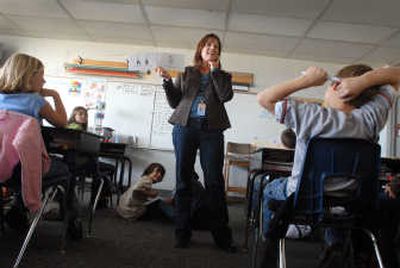Students to tutor younger kids

Starting next week, about 100 Mullan Trail Elementary School students in Post Falls will give up their afternoon recess three days a week in favor of staying inside at a desk, helping younger students read.
You could liken it to an employee giving up vacation time to train new hires. But these kids don’t seem to mind.
“It’s fun. I like hanging out with little kids and helping them read,” said 10-year-old Garrett Williams. “It gives little kids a chance to talk to someone if they need help.”
Garrett and his classmates began training for their new tutoring gigs Tuesday. They’re there by choice as part of the school’s new Kids Care Club, funded with money from the state Learn and Serve Idaho program that gives federal money to schools for educational public service projects.
Service learning, educators say, helps build citizenship by introducing students to community activities and bringing more real life relevance to the academic curriculum.
“We talk a lot about giving to the community in our school, but a lot of kids don’t have the opportunity to understand how they can help someone outside their school,” said Hilary Banger, a counselor at Coeur d’Alene’s Sorensen Magnet School for the Arts and Humanities.
Sorensen, Mullan Trail and Rathdrum’s Lakeland High School are among 12 Idaho schools awarded grants this year as part of a federal effort to build community service skills in the youngest citizens.
“The research says that students who are able to cross those boundaries, a much higher percentage of those individuals are willing to commit their lives to the common good of society,” said Lakeland High School science teacher Trent Derrick, who wrote the school’s grant.
Collecting canned food could coincide with a research report on hunger and poverty. Donating to an animal shelter could also mean studying animal overpopulation problems and solutions.
“Instead of just saying ‘we’re going to gather up books and donate them,’ it would incorporate curriculum standards in that service project,” said Mandy Surratt, Mullan Trail’s principal.
The grant money, typically $10,000, funds a program coordinator, guest speakers and curriculum materials and supplies. Each school will send a delegation of students to a youth leadership conference in Moscow next month.
Through the Mullan Trail Kids Care Club, fourth- and fifth-graders will tutor second- and first-graders in reading, organize a performance for younger kids at the public library and make books for children in Mexico and at a local shelter.
Lakeland High’s first activity will be “care to bear the cold” Friday night, where students will spend the night on the football field to try to raise awareness about the homeless. Next month, a motivational speaking group will present an all-school assembly. A teacher at Spokane’s Rogers High School will talk about life as an African refugee around the same time as students organize a food bank.
“We’re looking to do a lot of different things,” he said. “This grant is huge for us.”
At Sorensen, staff plan to use the grant for different grade-specific projects, Banger said, such as a school uniform exchange program as part of the third-grade recycling unit.
“That’s what I like about the grant,” she said. “You can be creative and help it to fit your needs as a school.”